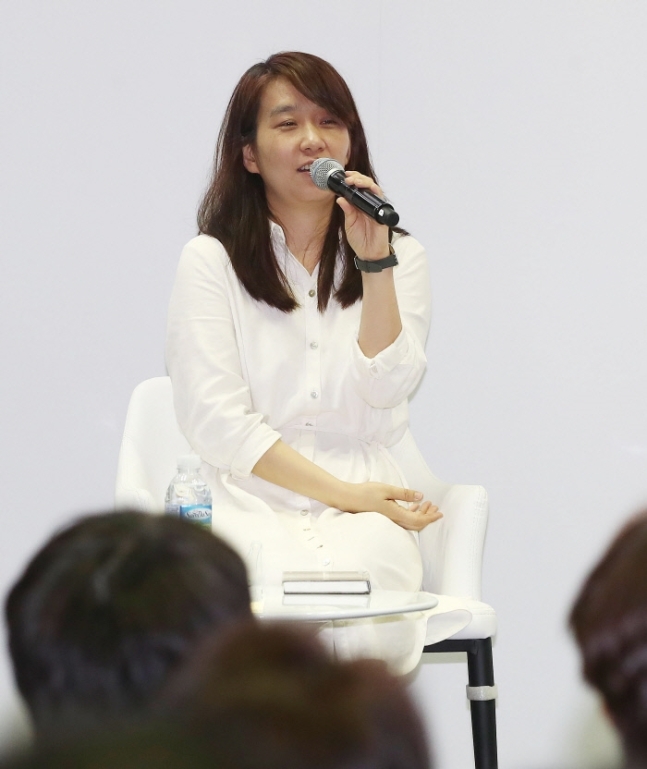It is often thought that novelists are prejudiced by their love for the printed word.
Writer Han Kang, the 2016 winner of the Man Booker International prize for her novel “The Vegetarian,” is among the prejudiced.
On Wednesday, Han shared her love for literature and printed books in a special lecture at the 2019 Seoul International Book Fair held at Coex in southern Seoul. Literature critic Kang Ji-hee hosted the event.
 |
Novelist Han Kang speaks at a lecture Wednesday at Coex in Gangnam, southern Seoul, during the 2019 Seoul International Book Fair. |
“I sometimes wonder, what will be the next thing after YouTube. Would it be printed books?” Han posed. With her calm voice, the writer set a mellow mood for the lecture hall, removed from the bustling book fair scene.
“I think people are starving for something analog ... and are hungry for things that they can touch. They long for things that they can touch, feel and have size and weight -- not a collection of images on screen.”
The 48-year-old writer took a step further and commented that books are an enhanced version of augmented reality in a way.
“People say the era of augmented reality is approaching. But we cannot go inside the inner minds, thoughts and feelings of others through augmented reality. It can stimulate the five senses but cannot go inside the souls,” Han said.
“Maybe the true augmented reality resides in books and literary works,” she said. “Literature deals with subjects like humans’ life, death, pain, love and grief, which are ever changing.”
Books can be a source of power for the writer. Han feels “charged” after reading books.
“After reading a lot, I feel that I have become stronger. When I cannot read due to the time, I feel somewhat faded … in a bad condition,” she said.
“Hungry for books, I binge-read books for days and then, at some point, I feel that I have become recharged. Not reading, it feels like I am falling apart. After reading, however, it feels as if the fallen pieces have come together.”
For Han, printed books are what truly makes her stronger. Though e-books have made a sizable dent on the publishing industry recently, printed books satisfy the writer.
“Reading e-books, it is hard to sense how much is left. Prints allow us to prepare for an ending with leftover pages. Novels are impacted by length, overall layout and designs. Paper books have this beauty that cannot be replaced by electronic books,” she said.
Han is currently writing the third and last part of a new trilogy, themed around snow.
“The last part is related to ‘Human Acts’ (another novel by Han). It is a story about after writing ‘Human Acts’ and how the novel changed me,” she said.
Though Han was supposed to finish the novel last winter, she is still writing, as the process has not been easy. In summer, she hopes to stay at home and finish the work.
“Writing a novel is like a very narrow road, as thin as a thread. Off the road a bit, the novel is not honest but becomes a cliche. Though the road seems to be cut off, I try to believe that there is a small road somewhere -- it is just that I cannot find it,” she said.
By Im Eun-byel (
silverstar@heraldcorp.com)








![[Weekender] Korea's traditional sauce culture gains global recognition](http://res.heraldm.com/phpwas/restmb_idxmake.php?idx=644&simg=/content/image/2024/11/21/20241121050153_0.jpg)